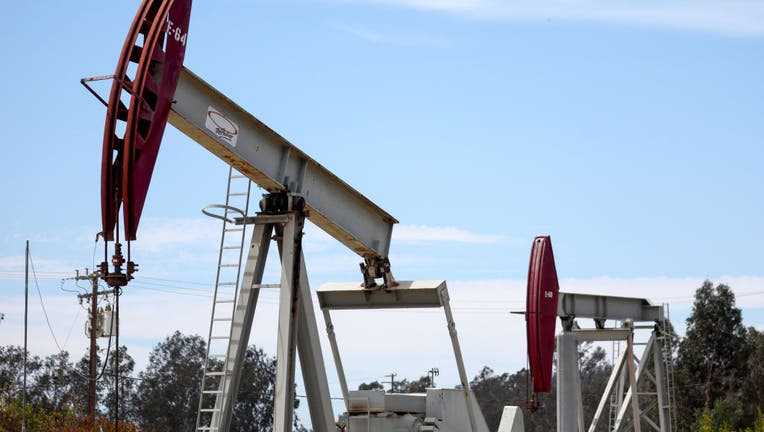OPEC, allies cutting world oil supplies as prices fall

Oil pumpjacks operate on August 5, 2022 near Ventura, California. The Inflation Reduction Act of 2022 holds provisions for climate change including tax incentives for clean energy production in what would be a major legislative accomplishment for the
FRANKFURT, Germany (AP) - OPEC and allied oil-producing countries, including Russia, cut their supplies to the global economy by 100,000 barrels per day, underlining their unhappiness with crude prices that have sagged because of recession fears.
The decision Monday by energy ministers means the cut for October rolls back the mostly symbolic increase of the same amount in September. The move follows a statement last month from Saudi Arabia’s energy minister that the group could reduce output at any time.
Oil producers such as Saudi Arabia have resisted calls from U.S. President Joe Biden to pump more oil to lower gasoline prices and the burden on consumers.
But worries about slumping future demand have helped send prices down from June peaks of over $120 per barrel, cutting into the windfall for the government budgets of OPEC+ countries but proving a blessing for drivers in the U.S. as pump prices have eased.
The energy minsters said in a statement that the September increase was only for that month, and that the group could meet again at any time to address market developments.
Other factors are lurking that could influence the price of oil. For one, the Group of Seven major democracies plan to impose a price cap on imports of Russian oil and what effect that might have on the market. The price level for the cap has not yet been set.
Meanwhile, a deal between Western countries and Iran to limit Tehran’s nuclear program could ease sanctions and see more than 1 million barrels of Iranian oil return to the market in coming months. However, tensions between the U.S. and Iran appear to have risen in recent days: Iran seized two U.S. naval drones in the Red Sea, and U.S., Kuwaiti and Saudi warplanes flew over the Middle East on Sunday in a show of force.
Oil prices have gyrated in recent months: Recession fears have pushed them down, while worries of a loss of Russian oil because of sanctions over its invasion of Ukraine pushed them up.
Recently, recession fears have taken the upper hand. Economists in Europe are penciling in a recession at the end of this year due to skyrocketing inflation fed by energy costs, while China's severe restrictions aimed at halting the spread of the coronavirus have sapped growth in that major world economy.
Those falling oil prices have been a boon to U.S. drivers, sending gasoline prices down to $3.82 per gallon from record highs of over $5 in June.
That month, fears that U.S. and European sanctions would take Russian oil off the market helped push Brent to over $123. Those concerns are still out there because European sanctions aimed at Russian oil shipments won't take effect until the end of the year.

